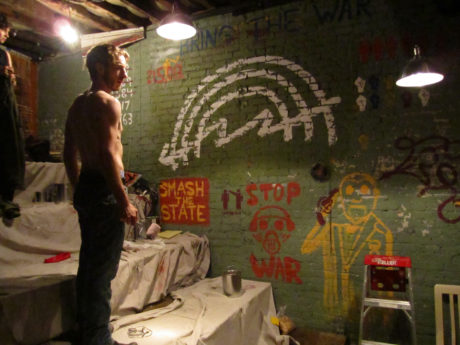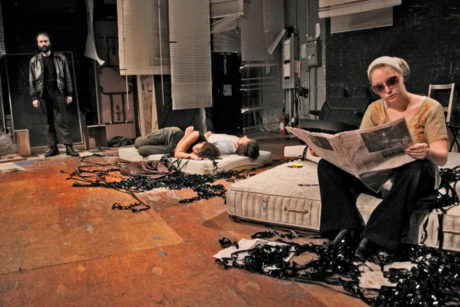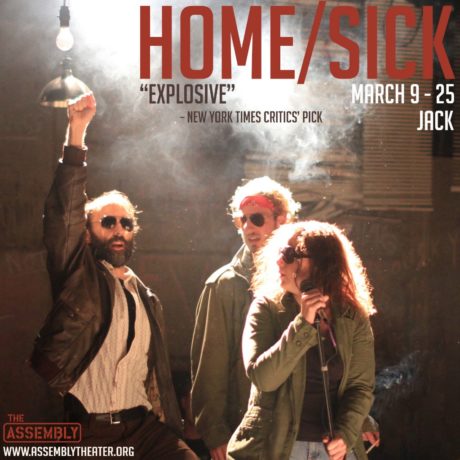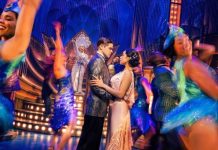The original cast and design team of 2011 return for The Assembly’s powerhouse revival of its critically-acclaimed hit Home/Sick. Presented at Brooklyn’s JACK, and directed by Jess Chayes (recipient of the 2017 Lucille Lortel Award), the ensemble-devised work (by Stephen Aubrey, Edward Bauer, Ben Beckley, Nick Benacerraf, Kate Benson, Marianne Broome, Jess Chayes, Anna Abhau Elliott, Luke Harlan, and Emily Louise Perkins) offers a fully immersive experience in its ardent exploration of the inside workings and motivations of the revolutionary Weather Underground (aka the Weathermen) in the 1960s and ‘70s, and its provocative look at the resonance of socio-political activism today.
Tracing the Weathermen’s origins as a radical splinter group of the Students for a Democratic Society (SDS), through its increasingly incendiary guerrilla tactics and in-fighting, to its eventual demise following the violent Brinks Robbery in 1981, the historically-based fiction is simultaneously well-researched and believably re-imagined, insightful and visceral, communal and personal. Inspired by the real people, and incorporating actual events and headlines, The Assembly gives its own creative spin on the internal evolution of the organization and its members, changing the names, inventing private dialogues, developing and inhabiting the semi-biographical personalities, and evoking a behind-the-scenes sensibility of what it was like to live underground in a common mission to right the wrongs of a Capitalist society, and, ultimately, to overthrow the US government with the use of deadly force.

From the moment we enter the performance space, we are transported to the era, encompassed all around by the simultaneous multitude of protest songs, slogans, speeches, and demonstrations of America’s self-empowering counter-culture. The performers, in character, address the audience directly, asking us questions, soliciting our opinions, and prompting us to take a stand. We immediately sense that we are part of a movement, something bigger than ourselves, yet one in which our voices are heard and we can make a difference. The Assembly makes us see, feel, and understand how the youth of America was swept away by the rising tide of collective action and commitment to change.
The spot-on environment designed by Nick Benacerraf, within which the audience is seated, combines elements from a variety of period sources inside a silver-foiled interior that recalls Andy Warhol’s legendary Factory. Under Chayes’ exciting and engaging direction, the actors move all around us and the space, which is fitted with the torn and dirty piled-up mattresses of a communal crash-pad; a vintage telephone, globe, radio, and glassware on a mid-century table; broken and stained Venetian blinds that have seen better days; the hand-made posters that dissenters distribute at rallies and street corners; and the graffiti that cover public and private walls with such familiar mantras as “Bring the War Home,” “Fuck the Pigs,” and “Hey, Hey, LBJ, How Many Kids Did You Kill Today?” Costumes by Deanna Frieman accurately define the characters, from bell-bottom jeans, a peasant blouse, and bandanas, to a leather jacket, army fatigues, and aviator sunglasses, and lighting by Miriam Nilofa Crowe evokes the claustrophobic darkness of the underground safe-houses, while spotlighting the speakers and giving focus to their impassioned words.
Asa Wember’s sound design provides an aural equivalent to the visuals, with the noise of cheering crowds and exploding bombs, excerpts from TV news reports and WABC radio broadcasts, and the strains of popular music, including live vocal and acoustic performances by the cast and recordings of such seminal hits as Bob Dylan’s “Subterranean Homesick Blues,” from whose lyrics the Weathermen took their name (“You don’t need a weatherman to know which way the wind blows”) and whose title inspired the name of The Assembly’s authentic production. The only glaring anachronism in the show is a movement-based segment in the second act – a theatrical trend of today that doesn’t fit with the otherwise genuine style of the period.

Photo by Nick Benacerraf.
A superb cast delivers the impassioned rhetoric and distinctive characterizations of the figures with full-out fervor and specificity. They shout with rage, smoke pot, have open sex, come to blows (fight choreography by Sean Chin), and repeat the same old clichés that some begin to question after the Vietnam War ends, the administration changes, and the contradictions of fighting for peace and using violence to stop the violence become increasingly evident to some of the group’s maturing members. Along with all the fury are some humorous passages, including the laughably obvious comment, as a meeting of the members descends into a vitriolic attack on one of its own, “I’m sensing a lot of negative energy in the room right now.”
Kate Benson turns in a fiery performance as the volatile Bernard. She is filled with explosive anger, as she espouses the revolutionary tenets to her fellow Weathermen, brutally questions their loyalties and commitment to the cause, and rules the group with an iron fist, while proclaiming that there are no leaders and everyone is equal. Ben Beckley as Tommy is vehement in his speech and domineering in his attitude, and Anna Abhau Elliott embodies Kathy’s unquestioning blind devotion, choosing to embrace the danger and self-sacrifice of the movement till the very end. In contrast with their intensity and zeal, Edward Bauer is timid and vulnerable as David, Luke Harlan brings clear thought and sensitivity to the more rational Paul, and Emily Louise Perkins is sweet, naïve, and nurturing as the young Anna, until she comes into her own and stands up for herself. Each and every one is outstanding.
Interspersed with the historical scenes are first-person monologues by the actors, breaking the fourth wall to discuss their interest in the story and attachment to the characters they portray, and giving current import to the theme of participating in our democratic process. Supplementing the performances is a post-show discussion series (“Making our Ideal America: Conversations on Coalition-Building”), featuring former Weathermen Mark Rudd, Bill Ayers, and Bernadine Dohrn, and other guest speakers.
Whether you lived through the period or weren’t born yet, The Assembly’s Home/Sick will let you relive both the idealism and conflicts of the troubled period, consider the value of socio-political involvement, and learn from the successes and mistakes of the past. You will be enlightened, entertained, and maybe even motivated by this stellar work.
Running Time: Approximately two hours and 5o minutes, with an intermission.

Home/Sick plays through Saturday, March 25, 2017, at The Assembly, performing at JACK – 505 ½ Waverly Avenue, Brooklyn, NY. For tickets, call (800) 838-3006, or purchase them online.




